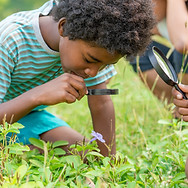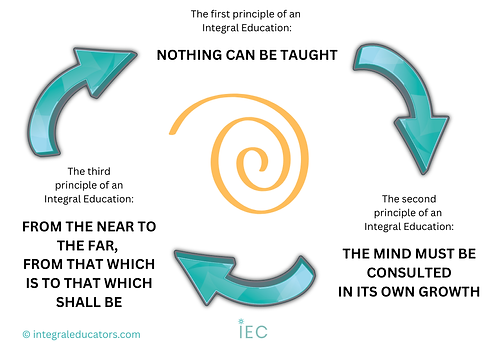IEC
Education for the 21st century is no longer about filling the mind with facts and figures, but to awaken the full capacity of the human intelligence and potential
The first principle of an Integral Education:
NOTHING CAN BE TAUGHT
Education of the full human potential
WHY?
Evolution of the individual's consciousness
-
True self awareness grows through personal discovery - not instruction - and is essential for understanding what drives our thoughts and actions.
-
Education must honour all human intelligences equally, allowing each child to develop their unique strengths and inner mastery.
-
Children build confidence and independence by taking responsibility, facing challenges, and learning from real experiences.
-
Critical thinking arises when we become aware of our inner conditioning and learn to act beyond ego, bias, or self-interest.
-
To live with wisdom and compassion, we must free ourselves from passing on inherited beliefs and values, allowing children the opportunity to evolve their consciousness beyond humanity's present ways of relating to themselves and the world.
The second principle of an Integral Education:
THE MIND MUST BE CONSULTED
IN ITS OWN GROWTH
Education for human unity
HOW?
Practice that builds our collective consciousness
-
Learning spaces should support each person’s unique pace and path, fostering acceptance of where they are and who they are.
-
Diverse environments - across age, ability, background, and identity - become rich grounds for shared learning and growth.
-
Education must honour different learning styles, allowing each child to find their own way of engaging with knowledge.
-
Assessment should come from self-reflection and meaningful action, not from fixed external standards.
-
Children need uninterrupted time, freedom of rhythm, and space for deep focus, movement, collaboration, and rest.
The third principle of an Integral Education:
FROM THE NEAR TO THE FAR,
FROM THAT WHICH IS TO THAT WHICH SHALL BE
Education relating to the world as one interconnected system
WHAT?
Realisation of a new, universal consciousness
-
The evolution of individual and collective consciousness can bring new ways of living and being.
-
Individuals with a growing self-awareness know that every action creates ripples - affecting themselves, others, and the natural world.
-
Education must emphasize that truth is made of many perspectives, and outcomes emerge from collective contributions.
-
Change doesn’t begin with distant goals, but through a growing awareness of the choices we make in each present moment. Children who take part in real decision - making develop agency and ownership of their growth.
-
Learning should explore the world as an interconnected system, with children empowered to question, understand, and lead solutions to humanity’s most complex challenges.
JOIN IEC's PROGRAMS
BASED ON THE THREE PRINCIPLES
OF AN INTEGRAL EDUCATION
WHEN?
-
Now! Parents and Educators being the change.
-
Deepen your self-knowledge to become more conscious in your actions as a parent, educator, and human being.
-
Grow into an integral educator equipped with insight, presence, and practical tools.
-
Learn to ask meaningful questions, hold multiple perspectives, and model thoughtful, empathetic action.
-
Develop the ability to truly meet the needs of children in today’s complex world.
-
Raise children not just for success, but to become caretakers of humanity and the Earth.
How to recognise if a learning environment is striving towards an Integral Education:

Systems
Nothing can be taught:
-
The facilitator (teacher) is a learner, researcher, and on a conscious journey of self-discovery.
-
Open and creative learning environments.
-
A system driven by individual and collective aspiration.
The mind must be consulted
in its growth:
-
Groupings are not age segregated, but form organically in different contexts based on needs, interests, or learning styles.
-
Living, co-created and evolving curriculum.
From the near to the far, from that which is to that which shall be:
-
Non-hierarchical and transparent structures.
-
Sociocratic or holacratic processes.
-
Flexible and open solutions.
-
Regular assessment to continue to serve the aim of education as the evolution of consciousness.

Methods
Nothing can be taught:
-
Self-directed learning, each child/youth follows their own path.
-
Free and open time and space.
-
Individualised learning programs and self-assessment.
The mind must be consulted
in its growth:
-
The optimal situations for learning and growth will look different for each child, and will vary in different areas of study. No one size fits all.
-
Value unity in diversity in learning environments - peer, mixed age/gender, neurodiversity, differently abled.
-
Individual guidance to grow from one VMEME towards the next, with the aim of embodying integral mindsets and worldviews.
From the near to the far, from that which is to that which shall be:
-
Systems thinking.
-
Looking at all learning through past, present, future perspectives.
-
Strive for love, knowledge, power, beauty.
-
Dream weaving.
-
Education as agency.


Content
Nothing can be taught:
-
Self-inquiry into the Faculties of human Consciousness to gain Self-knowledge.
-
Education as a practice of qualities: Sincerity, Humility, Gratitude, Perseverance, Aspiration, Receptivity, Progress, Courage, Goodness, Generosity, Equality, and Peace...
The mind must be consulted
in its growth:
-
Starting from where each one is at, and developing following the individuals expansion:
-
Education of all the parts of the being: Physical, Vital, Mental, psychic and Spiritual.
-
Education of all the human intelligences: linguistic, logical-mathematical, spatial, musical, bodily-kinesthetic, interpersonal, intrapersonal, and naturalistic.
From the near to the far, from that which is to that which shall be:
-
The faculties of our consciousness have essential correspondence with the main humanitarian subjects: Psychology, Philosophy, Linguistics, Sociology and History, Art and Culture, and Science of Nature. Transdisciplinary - every key subject can be combined with another subject, giving it a new dimension.
-
Individual, Collective and Universal processes as the starting point for all learning.
-
I - Us - Nature - education as connection and responsibility towards the whole.